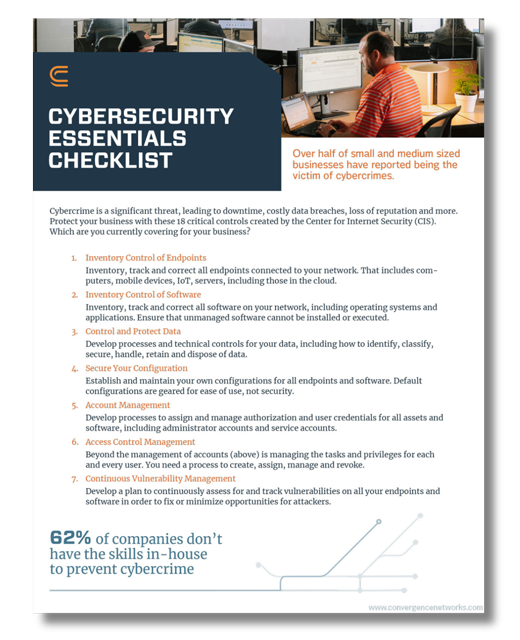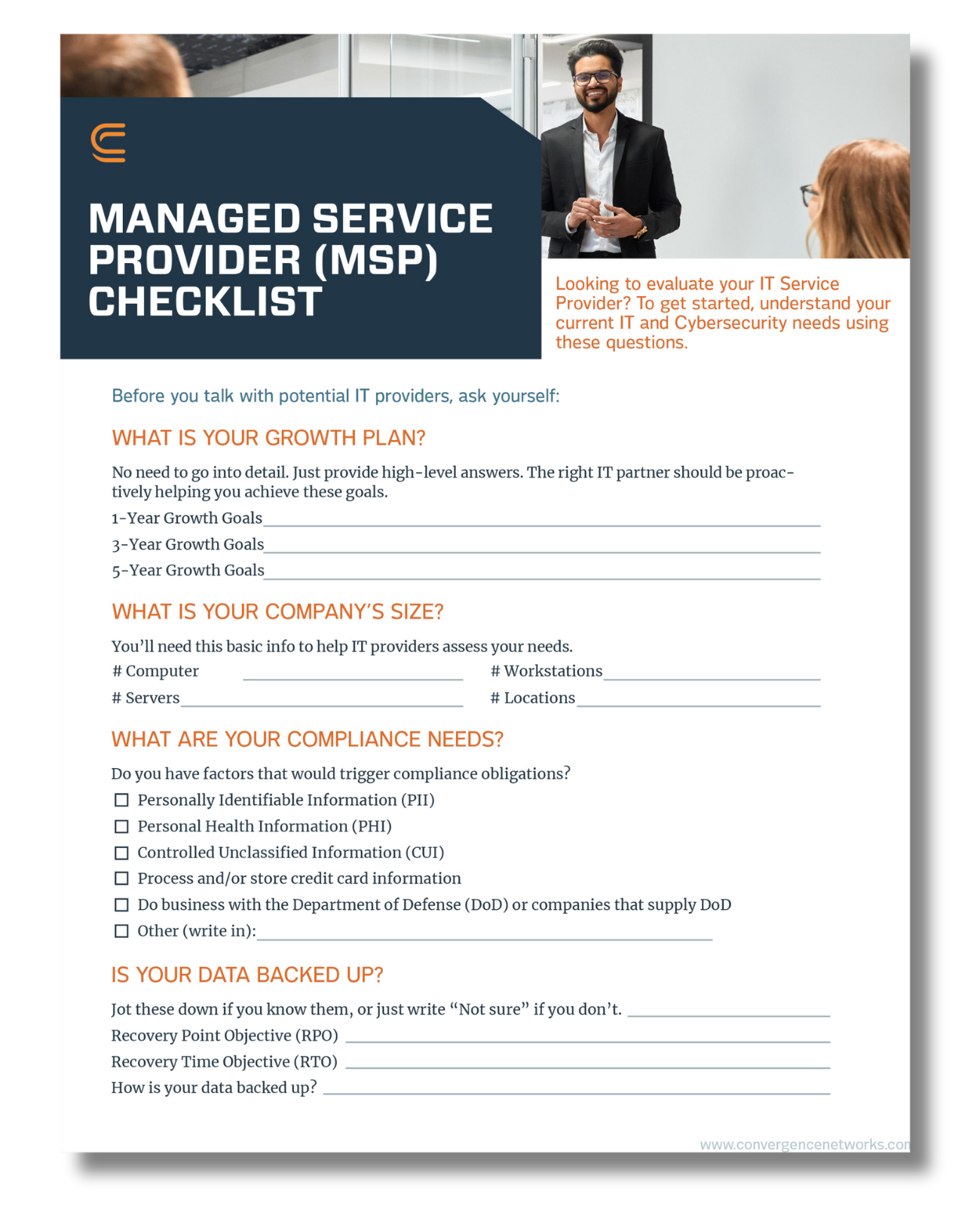Switching managed IT service providers can be a daunting task. Like most projects, taking it one step at a time will make the process easier. As a managed service provider (MSP), we have made this expert guide that should help:
Who to Contact
It’s good practice to be a little picky in who you reach out to with your checklist. Remember that there is no governing body or requirement to call oneself a MSP. Your time is best spent with serious candidates, so here as some tips to keep in mind:
- Does the company list the services you are looking for? Do those services seem like a core part of their business or more of an afterthought?
- Look for companies that have modern websites that seem professional. Is there any broken functionality or dead links? Does it look up-to-date or like something an intern cobbled together? Lack of professionalism here is often indicative of an immature business that hasn’t quite figured “it” out yet.
- Is the business based somewhere far away? Working with local vendors can offer big advantages. The staff members work and often live in the same community, and there is a greater sense of ownership and consequence. Will the CEO of the company you work with care about your business?
- Does the website provide transparency into the business and showcase their employees? Do the employees look happy? IT can be a stressful job, and you don’t want burned out or disgruntled employees with the keys to your kingdom!
Now that you’ve narrowed the field and have a nice group of candidates, you can move on to sending out our checklist templates. This will be very low effort for you, and will pay off in giving you a much clearer picture of the company you are thinking about working with. Here’s a checklist of questions business owners and IT professionals can use to sort through service providers and choose the best partner for their companies. Let’s jump in!
Assessing Technical Knowledge and Experience
You want an IT team that really knows its stuff and has proven ability to work well with clients. These questions will help you assess each potential company’s skill and experience. Send these questions to each candidate so they can respond before you decide to meet in person:
- Describe your company and provide an overview of your services, skills, people and knowledge.
- Describe your company’s relevant experience serving organizations with environments, verticals and needs similar to ours.
- List any relevant certifications or partnerships that support your company’s ability to successfully deliver service. (e.g. If you are looking for an MSP to build/support a Microsoft environment, is that MSP a certified Microsoft partner? Do they have engineers with relevant certifications?)
Industry Experience and References
Choosing a provider with relevant experience to your industry can be beneficial. Hearing positive feedback from a provider’s clients is always reassuring. Ask each IT company to provide the following for client references and one business reference from a company of similar size to your own.
- Name of company
- Reference point of contact
- Industry
- Length of relationship
- Reference contact information
Comparing Costs
Fees are one way to narrow down your choices for IT service providers. While straight, apples-to-apples comparisons may be difficult to make, this list of questions will help the providers outline their pricing structures.
- Describe your pricing structure and professional fees approach. Is there a minimum contract price? Please provide a price estimate range based on the size and complexity of our company. What does a typical client of our size, complexity and vertical end up paying annually, in total (with out-of-scope costs factored in)?
- What, specifically, does and does not fall under the scope of your managed agreements?
- For all out-of-scope work not related to the service agreement, please include a description of available services and related pricing.
Individual Meetings
Based on the answers you receive to the questions above and the discussions you have with references, you can select a few IT companies to interview. Whether you meet in person or by video conference, this discussion should include a brief summary of information the company has already provided and a deeper dive into the three categories that follow.
Strategic Planning Services
The managed services provider you choose can help you map out your organization’s short-term and long-term tech needs. In this way, the provider serves as a valuable partner: One that acts in the best interest of your company in terms of growth, productivity and profitability. Ask each potential provider questions like these:
- Describe your company’s ability to lead strategic IT roadmap development and executive-level planning discussions. Provide examples, references and tools used.
- Describe your company’s ability to lead budget planning discussions. Provide typical tools, reports and facilitation aids.
Relationship and Culture Fit
The last thing you want from a managed service provider is sub-par support and a difficult working relationship. Use these questions to guide your assessment of each provider’s approach to service and client relationships.
- Discuss your company’s account management philosophy and approach to delivering exceptional service to your clients.
- Provide profiles of your key client engagement staff and their relevant experience.
- Discuss the one area that would help make your client relationships more successful.
- Discuss your company’s service commitments and values.
- How do you support your employees in growing their careers and in ongoing education?
- What do you do to retain great employees? What is the average tenure of your non-executive employees?
Service Philosophy and Metrics
Here’s where you can ask for numbers and concrete examples to back up what each IT company says. Request information and documentation in these types of areas:
- Describe your service-level agreement standards and metrics.
- Describe your level of success meeting service-level agreements. Provide examples.
- Identify areas where you have not met service-level agreement and how you responded.
- Describe the organizational structure of your company’s help desk support and staff and how well-positioned your company is to support call volumes of 40-55 trouble tickets per month.
- Describe three client-related service areas that you know need improvement.
Security
MSPs often hold the metaphorical keys to the castle, so if your MSP is compromised, you are too. Never be afraid to ask blunt questions when it comes to security:
- How do you store client passwords and other sensitive information?
- Does your company require MFA on sign-ins for all of its employees?
- What security and/or background checks are your employees required to pass before receiving an offer of employment?
- Have any of your clients lost business data within the last year due to ransomware or other causes?
- Does your company provide security training to clients as well as your own employees? What training tools/sources do you use?
- Where could your company improve upon security? (Everyone can always improve: If someone says they and their clients are completely secure, consider it a red flag.)
- How does your company address a breach and/or cyber attack? Do you have a cyber attack response plan? Have you helped your clients build customized versions of these plans in the past?
Switching Managed IT Service Providers Made Easy
The hardest part of switching managed IT service providers is choosing one. From there, the provider should do everything possible to make the transition seamless for your company and staff.
An excellent IT team can be transformative to a business. If you feel like you’re just putting up with IT instead of feeling truly supported by IT, use this checklist to find a provider that’s a better fit. You’ll wonder why you didn’t make the switch sooner.














